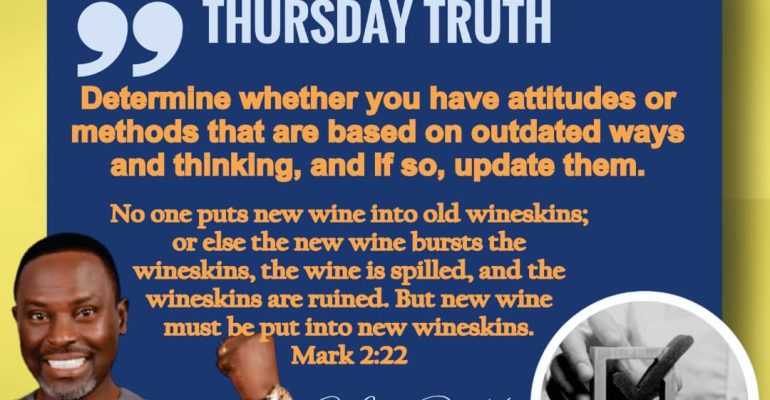Embracing Renewal: Updating Outdated Attitudes and Methods
March 14, 2024 2024-03-14 11:58Embracing Renewal: Updating Outdated Attitudes and Methods

Embracing Renewal: Updating Outdated Attitudes and Methods
Introduction
In the ever-evolving landscape of life, it’s essential to periodically assess our attitudes and methods to ensure they align with current realities and foster growth. Mark 2:22 offers valuable wisdom, urging us to recognize and update any outdated ways of thinking or doing. In this blog, we’ll explore the significance of this scripture and discuss practical steps to embrace renewal in our attitudes and methods, drawing inspiration from the timeless teachings of the Bible.
The Perils of Outdated Thinking
Outdated attitudes and methods can act as barriers to personal growth, hindering our ability to adapt to changing circumstances and seize new opportunities:
- Stagnation: Clinging to outdated ways of thinking or doing can lead to stagnation, preventing us from embracing new ideas or approaches.
- Inefficiency: Methods that were once effective may become obsolete over time, resulting in inefficiency and wasted effort.
- Resistance to Change: Outdated attitudes may foster resistance to change, making it difficult to navigate transitions or embrace innovation.
- Missed Opportunities: Holding onto outdated perspectives may cause us to overlook new possibilities or fail to recognize emerging trends.
Mark 2:22: A Call to Renewal
Mark 2:22 states, “And no one pours new wine into old wineskins. Otherwise, the wine will burst the skins, and both the wine and the wineskins will be ruined. No, they pour new wine into new wineskins.” This powerful analogy underscores the importance of embracing renewal and adapting to change:
- Embracing Change: The metaphor of pouring new wine into new wineskins emphasizes the need to embrace change and renewal rather than clinging to the past.
- Flexibility: Like wineskins that must be flexible to accommodate new wine, we must be open to new ideas and approaches, willing to adapt to changing circumstances.
- Growth Mindset: The process of renewal requires a growth mindset—one that sees challenges as opportunities for learning and improvement.
Updating Outdated Attitudes and Methods
- Self-Reflection: Take time for introspection and self-assessment, examining your attitudes and methods to identify any that may be outdated or no longer serving you well.
- Seek Feedback: Solicit feedback from trusted mentors, peers, or colleagues to gain insight into areas where improvement may be needed.
- Continuous Learning: Commit to lifelong learning, staying informed about emerging trends, best practices, and innovative approaches in your field.
- Embrace Innovation: Be open to new ideas and approaches, experimenting with different methods to find what works best for you in the current context.
- Cultivate Adaptability: Develop adaptability skills, learning to navigate change with resilience and agility.
Mark 2:22 in Action
Applying the wisdom of Mark 2:22 involves a deliberate commitment to embrace renewal and update outdated attitudes and methods:
- Let Go of Attachments: Release attachments to outdated ways of thinking or doing, recognizing that growth and renewal require letting go of the familiar.
- Embrace Change: Approach change with curiosity and openness, seeing it as an opportunity for growth and innovation.
- Foster Innovation: Create a culture of innovation in your personal and professional life, encouraging experimentation and creativity.
- Celebrate Growth: Celebrate milestones and achievements that result from embracing renewal, acknowledging the transformative power of updating outdated attitudes and methods.
Conclusion
Mark 2:22 serves as a powerful reminder of the importance of embracing renewal and updating outdated attitudes and methods. By cultivating a mindset of openness and adaptability, we can navigate change with grace and resilience, seizing new opportunities for growth and innovation. May this scripture inspire you to embrace renewal in your own life, continually updating your attitudes and methods to align with the ever-evolving landscape of possibility and potential.


